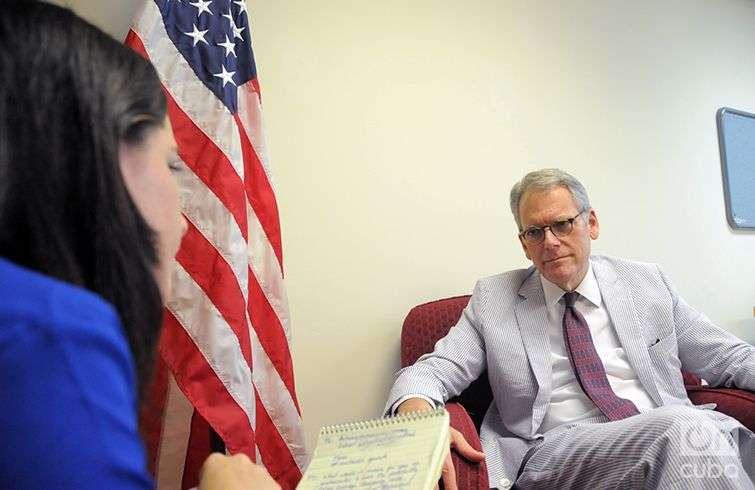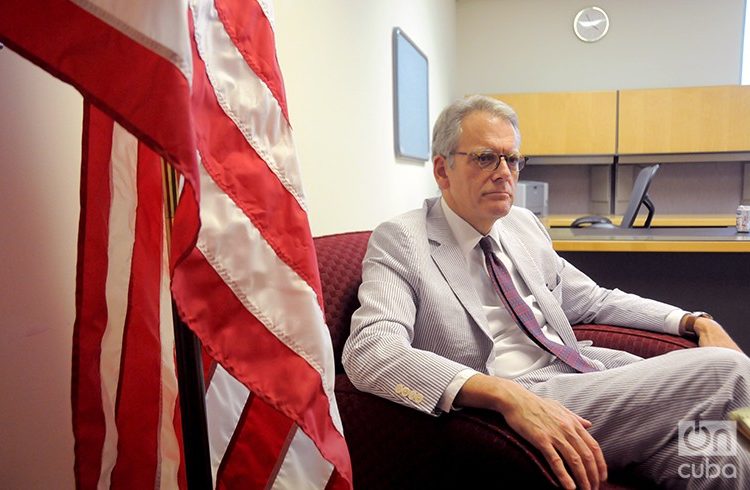The Stars and Stripes will be raised on August 14th at the entrance of the building that used to house the U.S. Interests Section in Havana, and that, since July 20th, became the Embassy of the United States in Cuba.
The symbolic act will give continuity to the one held in Washington, D.C., the day the Cuban flag was hoisted at the inauguration of the Cuban Embassy.
The trip of Secretary of State John Kerry to Cuba to take part in the inauguration ceremony on Friday, the avalanche of cameras and press, and the crowd of onlookers which will most likely fill every balcony in the area, will serve as public confirmation that the change in relations between the two countries is sealed.
Amid the intensity of the arrangements for the ceremony and the agitation that can be perceived in the aisles of the U.S. mission in Havana, its chief, Mr. Jeffrey DeLaurentis, who currently holds the post of Charge d’Affaires, devoted a few minutes to answer OnCuba’s questions about the future framework of operations of the new embassy.
What are the main changes deriving from this transformation from interests section to embassy?
As an embassy we will be able to engage a far broader number of Cubans across the island. Our negotiations focused on access [of the public] to the embassy and our ability to move around. Now we will be able to provide more information back home in terms of what is happening in Cuba, because we will be able to travel, and most certainly be more helpful. We’ll be able to inform American citizens about what they might find across the island.
But it’s really about being able to engage with a broad cross-section of Cubans, government officials, civil society and everyday Cubans that we weren’t able to before because we were required to seek approval to travel outside Havana. Now we can move freely.
We also want to be able to create a welcoming embassy where residents can come and visit, so we can have more interactions here. Obviously we want to serve the needs of the growing number of Americans who are visiting Cuba, but we also want to have a welcoming environment for Cubans who wish to visit us.
You may recall that in the past there were many Cuban guards around the building. This has changed now as well. So, it’s about access to the building; it’s about access to us and about our ability to move around the island. Those are two examples of how things will change.
So the guards we used to see out there were not part of a security service provided at the request of the U.S. mission?
No, they were SEPSA staff. You’ll have to ask them why they were there, but we certainly didn’t need as many to meet our security needs, and now we have far fewer of them.
So far the interactions of the U.S. mission have been limited to a very small section of the Cuban people. Which would be other groups of interest for the expansion you mentioned?
My own personal goal is: meet as many of the 11 million Cubans as I possibly can. We haven’t been able to do that. In cities and other parts of the country I hope to visit, we will be seeing a broad cross-section of people, including, of course, government officials.
In addition those trips, would this new freedom to reach other areas in the country allow for setting up a branch or consular office somewhere else in the country?
It’s a little bit premature to think about that, but in the past we had a consulate in Santiago de Cuba. Certainly, down the line, it’s something we’ll think about in order to provide services to Cuban nationals who may wish to travel to the United States and, again, for the growing number of Americans who are travelling across the island.
Will the fact that now there is an American Embassy in Cuba and the context of renewed relations between the two countries have an impact on the number of visas that are granted to Cuban nationals yearly?
It’s probably too early to tell. What it has affected so far, in a way, is the reverse: we’ve seen a lot more Americans travelling to the island. We hope to contribute to a greater reconciliation between the people of Cuba and the United States, and obviously that includes a lot of family members on both sides of the Florida Straits. So we could envision increasing demand for visas, but we just became an embassy a few days ago, and we would have to wait and see.
Over the first few months of 2015, the number of visas granted to Cuban applicants decreased by 10,000 in comparison to the same period of the previous year. Is this part of a new policy? Is this decrease to become a trend?
My guess is that a lot of that has to do with the fact that people are receiving multiple-entry visas now, and so there’s less of a need to come back each time someone wants to travel because they have a visa for five years.
And what about the assessment criteria used to grant or deny visas to Cuban nationals? Will they change?
No. We don’t foresee any change. The criteria we use for immigrant or non-immigrant visas is the same all over the world, and we have no plans to change that.
Will Cuban entrepreneurs interested in travelling regularly to the United States to purchase raw materials and other kinds of products for their businesses be given special treatment? What would happen in the cases of younger applicants, who are normally denied visas because they are considered to be potential immigrants?
I haven’t done consular work in a very long time, but what underpins all of our decision-making with respect to whether someone receives a visitor visa or not is that they need to overcome the presumption of immigration. It’s not just because they are young that they are denied a visa. You have to demonstrate certain ties to the community here, so if someone has a business, that will often make someone a good candidate, but frankly each case is different, so it’s hard to generalize.
Cuban officials have voiced their concerns regarding certain activities conducted by the U.S. Embassy in Havana, namely the journalism courses you offer. Are there any plans to make any changes in relation to this?
In the course of our negotiations over the last few months we focused on re-establishing diplomatic relations. We didn’t get into the specifics of the programs or activities of each agency beyond using the Vienna Convention on Diplomatic Relations as the basis. So as we go forward our democracy programs will continue; we are constantly reviewing them. Other kinds of activities, such as having a computer center, will also continue, I think we have these centers in over a hundred embassies around the world.
What would it mean to you as ambassador to be able to organize a visit of President Obama to Cuba in early 2016, should it come to fruition, and what would your role be in it?
I’ll answer two ways. One is that any chief of mission overseas would feel very privileged to organize a visit of their president to the country where they are serving. In terms of the president coming to Cuba, that’s a decision that he and his close advisors would make. I will certainly make a recommendation when the time comes, but obviously this is a decision that he would make.
Cuba will be welcoming Pope Francis soon. Does the U.S. mission have any expectations about this visit?
I think it is quite significant that he is spending a few days here, and then a few days in the United States. The Vatican certainly played an important role in helping the United States and Cuba come to the agreement that both presidents were able to announce on December 17. His visit to the United Sates is going to be more important for us. He is going to visit the UN and some other venues. It’s going to be quite a memorable visit.
Is there anything in particular you would like to say to the Cuban people?
We are starting on a new course and we hope to establish a respectful and cooperative relation with Cuba, the Cuban government and its people. There are going to be things on which we will disagree, but we also feel there’ll be things on which we will be able to cooperate. Going forward, we think this will be beneficial not only for both countries, but also for the region.
We also think that our own approach in engaging with Cuba in this new way will be very beneficial to the Cuban people, and will provide greater opportunities. It will be an opportunity for us, as well, to advocate the universal values we feel are very important.
Could you give us more details about the ceremony on Friday? Who are some of the Cubans who will be attending?
Planning is still underway. I can say that the Secretary of state will come and will preside over the ceremony. Guest lists are still being formed, but we anticipate that [Secretary Kerry] will see a broad variety of Cubans through the course of the day.










